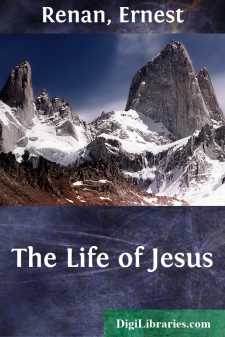Categories
- Antiques & Collectibles 13
- Architecture 36
- Art 48
- Bibles 22
- Biography & Autobiography 813
- Body, Mind & Spirit 142
- Business & Economics 28
- Children's Books 15
- Children's Fiction 12
- Computers 4
- Cooking 94
- Crafts & Hobbies 4
- Drama 346
- Education 46
- Family & Relationships 57
- Fiction 11828
- Games 19
- Gardening 17
- Health & Fitness 34
- History 1377
- House & Home 1
- Humor 147
- Juvenile Fiction 1873
- Juvenile Nonfiction 202
- Language Arts & Disciplines 88
- Law 16
- Literary Collections 686
- Literary Criticism 179
- Mathematics 13
- Medical 41
- Music 40
- Nature 179
- Non-Classifiable 1768
- Performing Arts 7
- Periodicals 1453
- Philosophy 64
- Photography 2
- Poetry 896
- Political Science 203
- Psychology 42
- Reference 154
- Religion 513
- Science 126
- Self-Help 84
- Social Science 81
- Sports & Recreation 34
- Study Aids 3
- Technology & Engineering 59
- Transportation 23
- Travel 463
- True Crime 29
The Life of Jesus
by: Ernest Renan
Categories:
Description:
Excerpt
LIFE OF JESUS
PLACE OF JESUS IN THE HISTORY OF THE WORLD.
The great event of the History of the world is the revolution by which the noblest portions of humanity have passed from the ancient religions, comprised under the vague name of Paganism, to a religion founded on the Divine Unity, the Trinity, and the Incarnation of the Son of God. It has taken nearly a thousand years to accomplish this conversion. The new religion had itself taken at least three hundred years in its formation. But the origin of the revolution in question with which we have to do is a fact which took place under the reigns of Augustus and Tiberius. At that time there lived a superior personage, who, by his bold originality, and by the love which he was able to inspire, became the object and fixed the starting-point of the future faith of humanity.
As soon as man became distinguished from the animal, he became religious; that is to say, he saw in Nature something beyond the phenomena, and for himself something beyond death. This sentiment, during some thousands of years, became corrupted in the strangest manner. In many races it did not pass beyond the belief in sorcerers, under the gross form in which we still find it in certain parts of Oceania. Among some, the religious sentiment degenerated into the shameful scenes of butchery which form the character of the ancient religion of Mexico. Amongst others, especially in Africa, it became pure Fetichism, that is, the adoration of a material object, to which were attributed supernatural powers. Like the instinct of love, which at times elevates the most vulgar man above himself, yet sometimes becomes perverted and ferocious, so this divine faculty of religion during a long period seems only to be a cancer which must be extirpated from the human race, a cause of errors and crimes which the wise ought to endeavor to suppress.
The brilliant civilizations which were developed from a very remote antiquity in China, in Babylonia, and in Egypt, caused a certain progress to be made in religion. China arrived very early at a sort of mediocre good sense, which prevented great extravagances. She neither knew the advantages nor the abuses of the religious spirit. At all events, she had not in this way any influence in directing the great current of humanity. The religions of Babylonia and Syria were never freed from a substratum of strange sensuality; these religions remained, until their extinction in the fourth and fifth centuries of our era, schools of immorality, in which at intervals glimpses of the divine world were obtained by a sort of poetic intuition. Egypt, notwithstanding an apparent kind of Fetichism, had very early metaphysical dogmas and a lofty symbolism. But doubtless these interpretations of a refined theology were not primitive. Man has never, in the possession of a clear idea, amused himself by clothing it in symbols: it is oftener after long reflections, and from the impossibility felt by the human mind of resigning itself to the absurd, that we seek ideas under the ancient mystic images whose meaning is lost....



